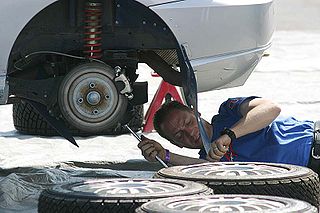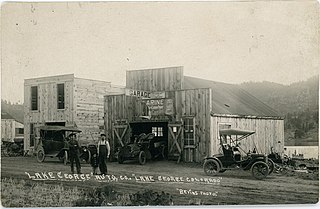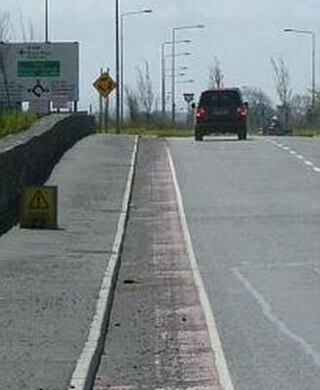
The Ford Pinto is a subcompact car that was manufactured and marketed by Ford Motor Company in North America from 1971 until 1980. The Pinto was the first subcompact vehicle produced by Ford in North America.

Unsafe at Any Speed: The Designed-In Dangers of the American Automobile is a non-fiction book by consumer advocate Ralph Nader, first published in 1965. Its central theme is that car manufacturers resisted the introduction of safety features, and that they were generally reluctant to spend money on improving safety. The work contains substantial references and material from industry insiders. It was a best seller in non-fiction in 1966.

Automotive safety is the study and practice of automotive design, construction, equipment and regulation to minimize the occurrence and consequences of traffic collisions involving motor vehicles. Road traffic safety more broadly includes roadway design.

A bumper is a structure attached to or integrated with the front and rear ends of a motor vehicle, to absorb impact in a minor collision, ideally minimizing repair costs. Stiff metal bumpers appeared on automobiles as early as 1904 that had a mainly ornamental function. Numerous developments, improvements in materials and technologies, as well as greater focus on functionality for protecting vehicle components and improving safety have changed bumpers over the years. Bumpers ideally minimize height mismatches between vehicles and protect pedestrians from injury. Regulatory measures have been enacted to reduce vehicle repair costs and, more recently, impact on pedestrians.

In the United States, a car dealership is a business that sells cars. A car dealership can either be a franchised dealership selling new and used cars, or a used car dealership, selling only used cars. In most cases, dealerships provide car maintenance and repair services as well as trade-in, leasing, and financing options for customers.

Advanced driver-assistance systems (ADAS) are technologies that assist drivers with the safe operation of a vehicle. Through a human-machine interface, ADAS increase car and road safety. ADAS use automated technology, such as sensors and cameras, to detect nearby obstacles or driver errors, and respond accordingly. ADAS can enable various levels of autonomous driving.
The National Highway Traffic Safety Administration is an agency of the U.S. federal government, part of the Department of Transportation, focused on transportation safety in the United States.

A car dealership, or car dealer, is a business that sells new or used cars, at the retail level, based on a dealership contract with an automaker or its sales subsidiary. Car dealerships also often sell spare parts and automotive maintenance services.
Lemon laws are laws that provide a remedy for purchasers of cars and other consumer goods in order to compensate for products that repeatedly fail to meet standards of quality and performance. Although many types of products can be defective, the term "lemon" is mostly used to describe defective motor vehicles, such as cars, trucks, and motorcycles.

An auto mechanic is a mechanic who services and repairs automobiles, sometimes specializing in one or more automobile brands or sometimes working with any brand. In fixing cars, their main role is to diagnose and repair the problem accurately and quickly. Seasoned auto repair shops start with a (Digital) Inspection to determine the vehicle conditions, independent of the customers concern. Based on the concern, the inspection results and preventative maintenance needs, the mechanic/technician returns the findings to the service advisor who then gets approval for any or all of the proposed work. The approved work will be assigned to the mechanic on a work order. Their work may involve the repair of a specific part or the replacement of one or more parts as assemblies. Basic vehicle maintenance is a fundamental part of a mechanic's work in modern industrialized countries, while in others they are only consulted when a vehicle is already showing signs of malfunction.

The Center for Auto Safety is a Washington, D.C.-based 501(c)(3) consumer advocacy non-profit group focused on the United States automotive industry. Founded in 1970 by Consumers Union and Ralph Nader, the group focuses its efforts on enacting reform though public advocacy and pressuring the National Highway Traffic Safety Administration and automakers through litigation. For decades, it was led by Executive Director Clarence Ditlow, who died in late 2016 from cancer. Ditlow was widely admired in the auto safety community, although he also had detractors among auto manufacturers. The Center for Auto Safety is currently led by Executive Director Jason Levine.

An automobile repair shop is an establishment where automobiles are repaired by auto mechanics and technicians. The customer interface is typically a service advisor, traditionally called a service writer.
When a person makes a claim for personal injury damages that have resulted from the presence of a defective automobile or component of an automobile, that person asserts a product liability claim. That claim may be against the automobile's manufacturer, the manufacturer of a component part or system, or both, as well as potentially being raised against companies that distributed, sold or installed the part or system that is alleged to be defective.

The 2009–11 Toyota vehicle recalls involved three separate but related recalls of automobiles by the Japanese manufacturer Toyota Motor Corporation, which occurred at the end of 2009 and the start of 2010. Toyota initiated the recalls, the first two with the assistance of the U.S. National Highway Traffic Safety Administration (NHTSA), after reports that several vehicles experienced unintended acceleration. The first recall, on November 2, 2009, was to correct a possible incursion of an incorrect or out-of-place front driver's side floor mat into the foot pedal well, which can cause pedal entrapment. The second recall, on January 21, 2010, was begun after some crashes were shown not to have been caused by floor mat incursion. This latter defect was identified as a possible mechanical sticking of the accelerator pedal causing unintended acceleration, referred to as Sticking Accelerator Pedal by Toyota. The original action was initiated by Toyota in their Defect Information Report, dated October 5, 2009, amended January 27, 2010. Following the floor mat and accelerator pedal recalls, Toyota also issued a separate recall for hybrid anti-lock brake software in February 2010.
Sudden unintended acceleration (SUA) is the unintended, unexpected, uncontrolled acceleration of a vehicle, often accompanied by an apparent loss of braking effectiveness. Such problems may be caused by driver error, mechanical or electrical problems, or some combination of these factors. The US National Highway Traffic Safety Administration estimates 16,000 accidents per year in the United States occur when drivers intend to apply the brake but mistakenly apply the accelerator.

Road debris, a form of road hazard, is debris on or off a road. Road debris includes substances, materials, and objects that are foreign to the normal roadway environment. Debris may be produced by vehicular or non-vehicular sources, but in all cases it is considered litter, a form of solid waste. Debris may tend to collect in areas where vehicles do not drive, such as on the edges (shoulder), around traffic islands, and junctions.

Takata Corporation was a Japanese automotive parts company. The company had production facilities on four continents, with its European headquarters located in Germany. In 2013, a series of deaths and injuries associated with defective Takata airbag inflators made in their Mexico plant led to a recall of 3.6 million cars equipped with Takata airbags. Further fatalities caused by the airbags have led the National Highway Traffic Safety Administration (NHTSA) to order an ongoing, US-wide recall of more than 42 million cars, the largest automotive recall in U.S. history. In June 2017, Takata filed for bankruptcy. It was acquired by Key Safety Systems. As of January 2024, over 100 million airbag inflators worldwide have been recalled by more than 20 carmakers.
A connected car is a car that can communicate bidirectionally with other systems outside of the car. This connectivity can be used to provide services to passengers or to support or enhance self-driving functionality. For safety-critical applications, it is anticipated that cars will also be connected using dedicated short-range communications (DSRC) or cellular radios, operating in the FCC-granted 5.9 GHz band with very low latency.

The Alliance for Automotive Innovation (AAI) is a Washington, D.C.-based trade association and lobby group whose members include international car and light duty truck manufacturers that build and sell products in the United States.
A pre-purchase inspection is an independent, third-party professional service that evaluates a vehicle’s condition before a purchase offer is made. Consumer protection organizations such as the Federal Trade Commission, the American Bar Association, insurance companies, and states recommend an independent pre-purchase inspection. The prospective buyer hires a qualified evaluator who examines the target vehicle for defects, hidden damage, maintenance history, and safety, then typically provides a written evaluation report. The service results in factual information that the prospective buyer uses as decision support for the vehicle purchase. Unless the vehicle is unsafe to drive, the evaluator does not provide a purchase recommendation.













